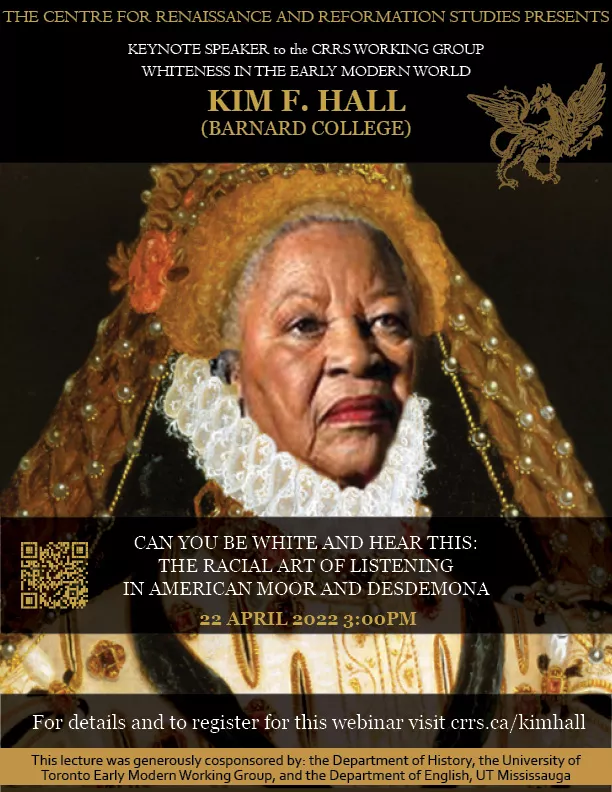
Can You Be White and Hear This? The Racial Art of Listening in American Moor and Desdemona
Event Date: Friday April 22, 2022 [3-5pm]
This talk was originally scheduled as the keynote presentation for the Whiteness in the Early Modern World, 1350-1800 working group (2020-21). CRRS and the event’s cosponsors are pleased to announce that Prof. Hall’s talk has been rescheduled.
Please click here to register.
Abstract: This talk examines the ways that Keith Hamilton Cobb’s American Moor and Toni Morrison and Rokia Traoré’s Desdemona address the whiteness of the various “industries” that discipline black responses to Shakespeare. Their appropriations of Shakespeare’s Othello speak over what W.E.B Du Bois called the color line by performing conversations that highlight the missed readings and over-readings in the play. Drawing on Jennifer Lynn Stoever’s The Sonic Color Line, I suggest that Morrison, Traoré, and Cobb are “theorists of listening” and of whiteness. Their plays demonstrate how Black speech and articulated Black experience are continually conditioned for white consumption. American Moor stages the ways the Black actor’s verbal and emotional exuberance is channeled and shaped by white interlocutors. Desdemona, by resituating Desdemona in the afterlife, is able to work around whiteness’ refusal to hear and create a listening space. Both pieces hold out hope for generative conversations across racial and historical divides, but make clear that true change will take place only with both Black decolonization and white unlearning.
Bio: Kim F. Hall is the Lucyle Hook Chair of English and a Professor of Africana Studies at Barnard College where she teaches courses in Early Modern/ Renaissance Literature, Black Feminist Studies, Critical Race Theory and Food Studies. She is the author of Things of Darkness: Economies of Race and Gender in Early Modern England, Othello: Texts and Contexts and The Sweet Taste of Empire: Sugar, Gender and Material Culture in Seventeenth Century England (under contract with UPenn Press). She was the 2018 Wanamaker Fellow at Shakespeare’s Globe and in 2016, Diverse Issues in Higher Education named her one of “25 Women Making a Difference in Higher Education and Beyond.” Her most recent publications include “I Can’t Love You the Way You Want Me to: Archival Blackness” in postmedieval: a journal of medieval cultural studies (2020) and “On Yearning,” in the essay cluster, “Shakespeare and Black America” that she edited with Patricia Cahill for The Journal of American Studies (Spring 2020). Both of these are part of the book project, ‘Othello Was My Grandfather’: Shakespeare and Race in the African Diaspora, for which she has received grants from the NEH, the National Humanities Center and the Schomburg Center for Research in African-American Culture.
Cosponsored by the Department of History, the University of Toronto Early Modern Working Group, and the Department of English and Drama, UT Mississauga.
